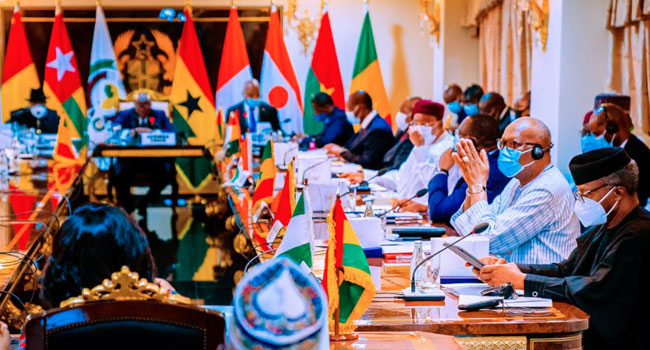On Sunday, the leaders of West Africa gathered in Ghana to discuss the sanctions imposed on three nearby nations. Economic and financial sanctions were lifted by Ecowas leaders of governments. Burkina’s transition plan for Mali was approved, and Guinea was given an extra month to come up with a “acceptable” timetable. Umaro Sissoco Embalo, the president of Guinea-Bissau, was chosen to serve as the bloc’s next chairman during the conference.
At a regional summit on Sunday, West African leaders decided to ease sanctions against the two neighboring military-run countries of Mali and Burkina Faso.
President of the Ecowas Commission Jean-Claude Kassi Brou stated in Accra that the head of states had struck a deal with Bamako, which had vowed a return to democratic government.
The West African presidents relaxed the six-month-long embargo placed on Mali if the 15-nation regional group maintained Mali’s suspension from Ecowas entities. Additionally, according to Jean-Claude Kassi Brou, the presidents determined that “the sanctions adopted in terms of recalling the ambassadors of ECOWAS member country” would be “removed, so the ambassadors would be able to return to Bamako.”
Following Mali’s military government’s announcement of a plan to rule for five years, ECOWAS imposed a trade and financial embargo on the country in January.
The majority Mali and Ecowas have agreed that elections for the presidency will take place in February 2024. Legislative elections will take place in late 2023, followed by a referendum on a rewritten constitution in March 2023. According to Brou, ECOWAS will keep an eye on the situation.
Burkina Faso transition
Burkina Faso, another Sahel nation embroiled in terrorist unrest, had previously only been suspended from the 15-nation bloc’s committees.
A constitutional referendum and parliamentary and presidential elections in February 2025 were suggested by Burkina’s junta, and both were accepted.
“Burkina Faso’s government has submitted a new proposal that would extend the country’s transition period by 24 months, beginning on July 1. […] Following President Kabore’s release, the chiefs of state made the following choice “stated Kassi Brou. Indeed, Roch Marc Christian Kaboré was declared to be “totally free” by the military administration of Burkina Faso. His political party lamented his loss of freedom ever since he was removed.
Even the release of former president Kaboré was demanded by the leaders of ECOWAS.
Following Mali in August 2020 and January and September 2021, respectively, Burkina Faso experienced a coup.
Guinea
No progress was made if the leaders of West Africa also gathered in Ghana to discuss the sanctions put in place on Guinea. The 36-month transition period proposed by Conakry was mentioned by the president of the Ecowas panel. Yayi Boni, the former president of Benin, was appointed as the group’s new mediator, and they anticipated getting a new election schedule by the end of the month.
Guinea’s junta has so far rejected the mediator appointed by ECOWAS and declared a 36-month transition, which the African Union chairwoman has referred to as “unthinkable.”
The leaders of the main political parties in Guinea met with them on Monday, but they have made it clear that their participation in the discussion is contingent upon the selection of an ECOWAS mediator.
According to Kassi Brou, the three countries’ suspension from ECOWAS will be in effect until elections are held in each of them.





